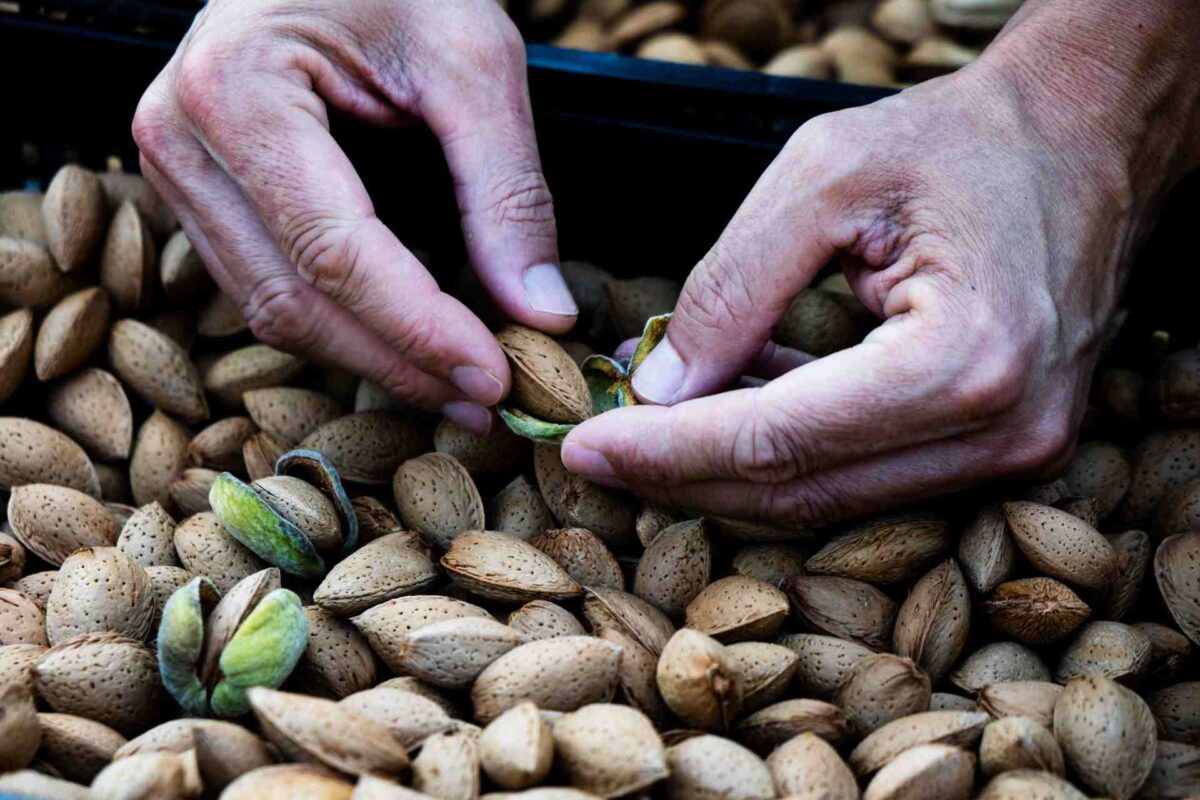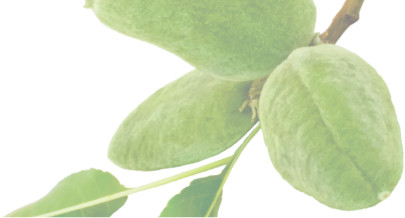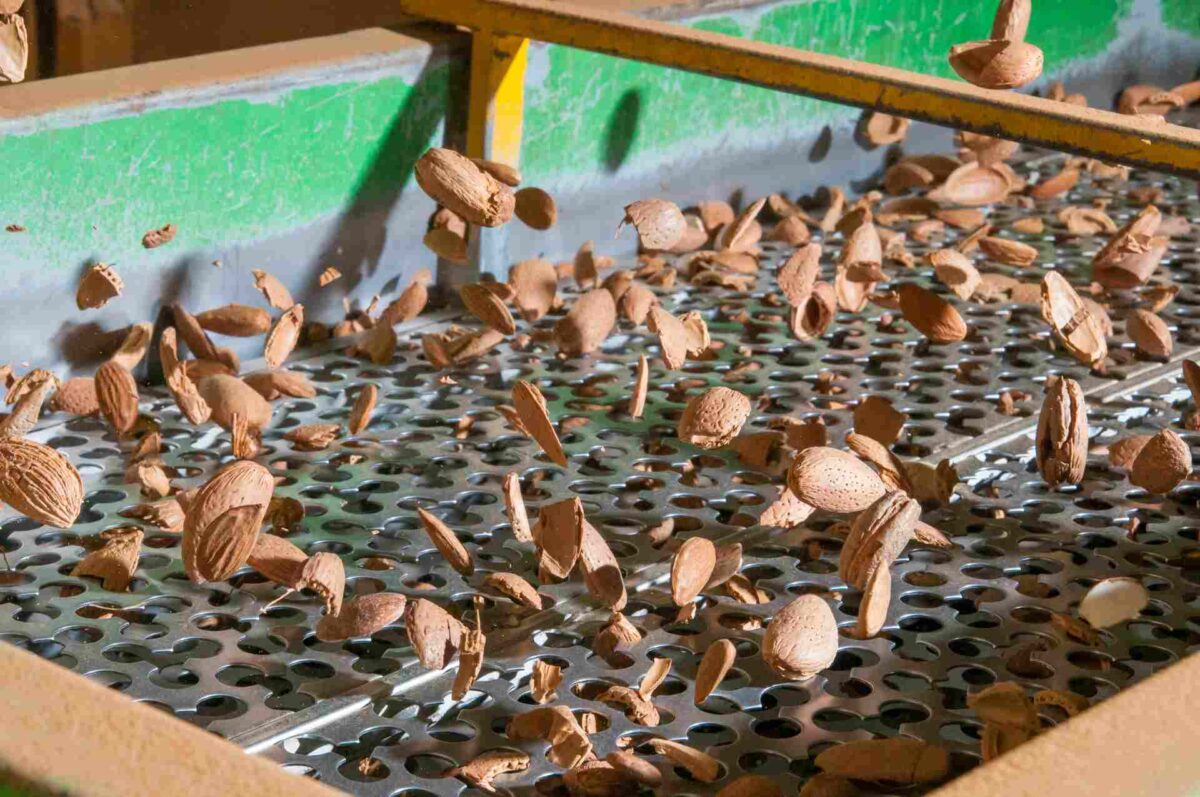Beyond the Nut: Key Almond By-Products and their Applications
Utilizing almond by-products not only reduces pressure on landfills but also fosters a circular economy within the almond industry. This closed-loop system minimizes waste and maximizes resource utilization, ultimately lowering the environmental footprint of almond production. Additionally, by diverting by-products from traditional disposal methods, potential water conservation benefits arise. The water that would have been used to grow alternative sources of fiber, fuel, or bulking agents can now be preserved.
Let’s delve into the key almond by-products and explore their exciting possibilities:
Almond Hulls: A Treasure Trove of Nutrition & Sustainability
Almond hulls are the fibrous outer layer surrounding the almond shell. Surprisingly rich in nutrients, they boast high levels of dietary fiber and antioxidants. Almond hulls have primarily been used in cattle and chicken feed to replace alfalfa hay, a sustainable practice that saves billions of gallons of water.
And as of more recently, almond hulls are beginning to be incorporated into human food. This unique nutritional profile makes them a valuable addition to various food products. Research is beginning to show specific benefits of incorporating almond hulls into food production:
- Dietary Fiber Powerhouse: Almond hulls can be incorporated into bakery goods, cereals, and snacks to boost their fiber content. This caters to the growing consumer demand for high-fiber products that promote digestive health and satiety. Studies have shown that increasing fiber intake can help regulate blood sugar levels and promote a feeling of fullness, potentially leading to weight management benefits.
- Natural Prebiotic Ingredient: The prebiotic properties of almond hulls make them a promising ingredient for gut health products. Prebiotics nourish beneficial gut bacteria, promoting a healthy digestive ecosystem and potentially aiding in immune function [3].
- Sustainable Pet Food Formulations: Upcycled almond hulls can be included in pet food formulations as a source of fiber and essential nutrients. This not only reduces waste but also contributes to the growing market for sustainable pet food options.
Almond Meal: More Than Just Flour
While both almond flour and almond meal are derived from almonds, they are distinct products with unique characteristics. Almond flour is a finely ground powder made from blanched almonds, where the skins have been removed before processing. This results in a lighter colored flour with a milder flavor and a smooth texture, ideal for delicate pastries and baked goods.
In contrast, almond meal is a coarser product produced by grinding whole almonds, including the skin. This inclusion of the skin gives almond meal a slightly darker color, a more pronounced nutty flavor, and a coarser texture compared to almond flour. Despite these differences, both almond flour and almond meal offer a variety of functional benefits for food manufacturers:
- Gluten-Free Baking Alternative: For individuals with gluten sensitivities or celiac disease, almond meal provides a delicious and nutritious gluten-free substitute for wheat flour. Its coarse texture and binding properties make it suitable for a variety of baked goods, from cookies and muffins to cakes and breads. This caters to the ever-growing demand for gluten-free options in the food market.
- Nutrient-Rich Addition to Protein Bars and Energy Bites: Almond meal is a powerhouse of nutrients, boasting a significant amount of protein, healthy fats, essential vitamins, and minerals. This makes it a valuable ingredient for protein bars and energy bites. Including almond meal naturally boosts the protein content of these on-the-go snacks, promoting satiety and sustained energy levels.
- Thickening Agent for Sauces, Soups, and Stews: The coarse texture of almond meal makes it a fantastic natural thickener for various savory applications. It can be used as a substitute for traditional thickeners like cornstarch or flour, adding a subtle nutty flavor and a satisfying textural element to sauces, soups, and stews. This caters to the growing trend of using whole, unprocessed ingredients in food products.
Almond Shells: Beyond Mulch
Traditionally, almond shells have served a practical purpose as mulch for gardens and landscapes, and bedding for livestock. Additionally, their high energy content makes them a viable source of fuel for industrial boilers. However, innovative research and development are pushing the boundaries of their potential, transforming almond shells into valuable resources for a more sustainable future.
- Biochar Production for Soil Health Improvement: Biochar is a charcoal-like substance derived from the thermochemical conversion of organic materials like almond shells. Biochar improves soil fertility by increasing its water retention capacity and promoting the growth of beneficial microbes. This can lead to improved crop yields and overall agricultural sustainability.
- Activated Carbon Filters for Water Purification: Crushed and processed almond shells can be used to create activated carbon filters. Activated carbon is highly effective in removing contaminants and impurities from water, making it a valuable tool for water purification systems.
- Sustainable Packaging Materials: The growing environmental concerns surrounding traditional plastic packaging have spurred the development of innovative and eco-friendly alternatives. Almond shells are emerging as a promising source for sustainable packaging materials. Through various processing techniques, almond shells can be transformed into composite materials suitable for creating packaging solutions with a lower environmental footprint.
- Almond Shells as a Natural Dye: The world of fashion is also tapping into the potential of almond shells. Studies have shown that extracts from almond shells, as well as almond skins, can be used as a natural dye for wool textiles. This offers exciting possibilities for creating sustainable and eco-friendly clothing with unique color options.
Leading the Way with Sustainable Almond Solutions
As we’ve seen, the almond industry is undergoing a transformation, unlocking the potential of what was once considered waste. Harris Woolf Almonds is at the forefront of this exciting shift. We offer a diverse range of premium almond ingredients derived with a commitment to minimizing environmental impact. Partner with Harris Woolf Almonds and elevate your business with unmatched quality, sustainable solutions, and access to innovative almond by-products. Explore the possibilities and discover how HWA can empower your sustainable future.
Learn more about Harris Woolf Almonds and explore our products.














